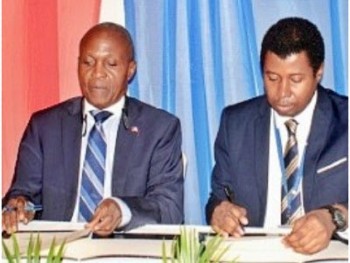PORT AU PRINCE, Haiti – President of the Provisional Electoral Council (CEP), Patrick Saint-Hilaire, says he hopes that the agreement signed with the State University of Haiti (UEH) will go beyond just the training on electoral issues in Haiti.
 “The CEP welcomes the commitment of the Rectorate, which, through the Faculty of Law and Economics, will enable partner institutions, researchers, and students to greatly benefit from this initiative.
“The CEP welcomes the commitment of the Rectorate, which, through the Faculty of Law and Economics, will enable partner institutions, researchers, and students to greatly benefit from this initiative.
“The electoral institution expresses the hope that the UEH Rectorate will strive to implement this agreement as of the next academic year. He therefore suggested that this training be added to the curriculum of all law faculties and schools, particularly in provincial cities operating under the UEH,” he told the signing ceremony.
Saint-Hilaire signed with the UEH Rector, Dieuseul Prédélus, two documents officially sealing the agreement for the implementation of the “Chair of Law and Administration of Electoral Operations in Haiti” as well as the document formalizing its creation.
Saint-Hilaire said Haiti’s democratic future is not built solely at the ballot box, but also in ideas, adding “with this electoral chair, there is no doubt that the CEP is embarking on a bold gamble: putting knowledge at the service of the transition, democracy, and the rule of law”.
The university sector representative at the CEP, Florence Mathieu, said that the chair aims, among other things, to contribute to the training of executives in electoral professions to ensure the effective organization and management of elections in Haiti.
It will also provide certified and diploma-granting training to electoral professionals as well as to conduct scientific research on elections and their issues, promoting an interdisciplinary approach linked to various disciplines in the humanities and social sciences and to strengthen the capacities of the electoral administration, Departmental Electoral Offices (BED), Municipal Electoral Offices (BEC), and other relevant institutions.
Haiti has not held presidential elections since 2016 when Jovenel Moise was elected as head of state. Moise was assassinated on July 7, 2021 and the country has not held legislative or presidential elections.
The authorities are hoping to hold elections in November this year amid security concerns as a result of the activities of criminal gangs that control more than 90 per cent of the capital, Port au Prince.
Prédélus told the signing ceremony that the establishment of the UEH chair stems from the observation of a fragile Haitian electoral system that generates recurring political crises.
“Without adequate expertise, the electoral administration becomes vulnerable to partisan manipulation. It is therefore imperative to train professionals capable of strengthening the legitimacy of the electoral process.”
The President of the Chair’s Scientific Council, Eugène Pierre-Louis, said this initiative responds to the urgent need to “normalize” Haitian democracy and break out of a vicious cycle of contested elections, endless transitions, and post-election crises.


